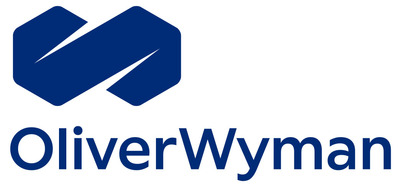Unprecedented Generative AI Use Does Not Guarantee Quick Productivity Gains
Oliver Wyman Forum Finds Challenges Remain in Training Current and Future Workforces
The report, from Oliver Wyman's think tank, the Oliver Wyman Forum, found that more than half of employees globally now use generative AI at work and that adoption is far higher in some countries. The Forum also found that adoption has not necessarily translated into higher levels of productivity – yet.
"The adoption rate of generative AI has been nothing short of remarkable," said John Romeo, CEO of the Oliver Wyman Forum. "ChatGPT achieved mass adoption in less than one year -- a stark contrast to the internet, which took 17 years, smartphones 21 years, and electricity which took three decades, but training is not keeping up and we are facing an AI productivity disconnect."
Forecasting business impact over the next decade, the report shows generative AI-trained junior employees will climb into management ranks faster than ever before. And senior-level leaders express the greatest levels of concern about losing their jobs to generative AI automation, according to the report.
Key workplace findings from the report are below:
- Developing Countries Ahead:
India leads 16 countries in employee adoption with83% surveyed reporting daily or at least weekly use of generative AI. By contrast, weekly use by North American and European employees is below50% . - Explosive Growth Among Pink & Blue Collars: Between June and November 2023, generative AI use exploded among white-collar knowledge workers as well as pink-collar workers. Doctors, nurses, and life-sciences employees increased weekly use by
264% . Weekly adoption among pink-collar education employees grew144% , and blue-collar retail worker use increased by71% . - Productivity Gains Are Years Away: As many as
20% of employees who report generative AI has not increased their productivity say they are bogged down by corporate guidelines and "unsatisfactory output" which adds review and editing time to projects. The full potential of generative AI's productivity gains is still six to 10 years away, according to the report. - Generative AI Training Gap: Lack of productivity may be linked to insufficient training. Employees at all levels seek more upskilling than employers currently provide. Among white-collar employees,
80% want more or better AI training, but only64% currently say they receive it. This gap is wider among pink-collar employees. - Job Loss Concern: Across the 17 industries and job types studied,
60% of employees express increasing concern their jobs will be replaced by generative AI. Globally,30% of all job seekers say generative AI is motivating their job search. Employees who worry about AI are57% more likely to feel their productivity is declining and78% more likely to believe they don't matter to their employer, according to recent data from the American Psychological Association.
Consumer findings include:
- Bias concerns: In all 16 countries studied, most consumers are concerned generative AI is producing biased content. People are most concerned in
India (92% ) and least concerned inFrance (73% ) while83% of US respondents report being are concerned. - Trust is shaken: When asked if organizations using generative AI are untrustworthy,
29% said "yes," with18% saying generative AI tools "are not trustworthy at all" or "not very trustworthy." - Privacy, cybersecurity and more: Privacy, cybersecurity and overreliance on generative AI are the top three concerns for over
30% of consumers, but many cited additional worries, including job loss (29% ), environmental impact (15% ) and mental health (14% ).
Ana Kreacic, COO of the Oliver Wyman Forum and Chief Knowledge Officer of the Oliver Wyman Group commented: "Automation is no longer just a narrative of blue-collar workers. Many white-collar workers fear their roles will become displaced with generative AI, and this anxiety is having a direct impact on productivity. It's a misconception for businesses to wait a year or two and hope to hire a fully generative AI trained workforce. Companies need to reskill the employees they have now by focusing on areas with the most near-term applications."
About the report
Oliver Wyman Forum conducted the survey to enhance its understanding of generative AI, specifically in the context of the workplace, the consumer economy, and risk. The survey was conducted in June and November 2023 among a total of 25,000 respondents across 16 countries including:
About Oliver Wyman
Oliver Wyman is a global leader in management consulting. With offices in more than 70 cities across 30 countries, Oliver Wyman combines deep industry knowledge with specialized expertise in strategy, operations, risk management, and organization transformation. The firm has more than 7,000 professionals around the world who work with clients to optimize their business, improve their operations and risk profile, and accelerate their organizational performance to seize the most attractive opportunities. Oliver Wyman is a business of Marsh McLennan [NYSE: MMC].
![]() View original content to download multimedia:https://www.prnewswire.com/news-releases/unprecedented-generative-ai-use-does-not-guarantee-quick-productivity-gains-302035089.html
View original content to download multimedia:https://www.prnewswire.com/news-releases/unprecedented-generative-ai-use-does-not-guarantee-quick-productivity-gains-302035089.html
SOURCE Oliver Wyman








